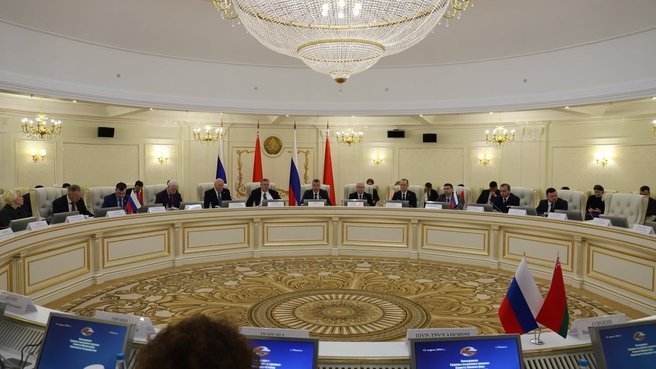The participants discussed joint efforts to promote trade and economic cooperation between Russia and Belarus.
Russian Deputy Prime Minister Alexei Overchuk and Ambassador Extraordinary and Plenipotentiary of the Republic of Belarus with the authority of Belarusian Deputy Prime Minister Dmitry Krytoi held a meeting of the High-Level Group of the Union State Council of Ministers. The meeting took place in Minsk, Belarus. It was attended by State Secretary of the Union State Dmitry Mezentsev, Ambassador Extraordinary and Plenipotentiary of the Russian Federation to the Republic of Belarus Boris Gryzlov and representatives of relevant Russian and Belarusian ministries and departments.
The co-chairs of the High-Level Group reviewed their joint efforts to promote trade and economic cooperation between Russia and Belarus. They focused on the development of transport connections between the two countries, synchronisation of their customs duties, regulation of transport fees, creation of more convenient conditions for mobile telephone users, regulation of taxi services and the implementation of the mutual visa recognition agreement.
Opening the meeting, Alexei Overchuk emphasised that Russia and Belarus are moving towards creating a common economy. They have fulfilled the 28 union programmes and endorsed new main areas of work for the next period of 2024–2026.
“In 2023, the Belarusian economy grew by 3.9 percent, while the Russian economy increased by 3.6 percent – this figure is still being finalised. The Russian and Belarusian economies are growing at higher rates than the economies of the EU countries that have imposed illegal sanctions on us. In 2023, Russia’s total accumulated investment in the Belarusian economy grew by 6.7 percent to almost $2.9 billion. The share of transactions in national currencies in the Union State are at 92 percent. So we can say that we have converted our transactions to national currencies between Russian and Belarusian economic operators,” Mr Overchuk said.
The co-chairs emphasised the importance of continued production cooperation between Russian and Belarusian companies. “We are producing products with high added value, which can compete in external markers as well. We are doing much for these products to freely reach our main markets in the East and the Global South. Russia is doing very much to support Belarus in this respect,” said Mr Overchuk. “We continue implementing our inter-governmental agreement on fulfilling joint investment projects to the tune of 105 billion Russian roubles. Our industrial ministers have drafted technical specifications for import-substitution projects worth 81 billion Russian roubles. The remaining funds will be spent on our initiatives, import substitution and consolidation of our economies. The implementation of sixteen investment projects is already underway in Belarus,” said Mr Overchuk.
Our countries continue to strengthen interregional cooperation. Over 80 Russian regions maintain trade and economic ties with the Republic of Belarus. “Between March 2022 and February 2024, companies from 72 constituent entities of the Russian Federation signed 5,236 foreign trade contracts with their Belarusian partners, of which 3,387 and 1,849 were export and import contracts, respectively, totalling over 120 billion Russian roubles, under the import substitution policy,” said the Deputy Prime Minister. “Our forums also contribute to strengthening ties between regions. This year, the Forum of Regions of Russia and Belarus will be held in Vitebsk, Polotsk and Novopolotsk (Republic of Belarus), and will be dedicated to the role of interregional cooperation in building the innovative economy of the Union State. Surely, this event will help promote relations between our countries, and our companies will sign new contracts on the sidelines of the forum. All this speaks of a constructive, friendly and fraternal approach to the great joint work carried out by Russia and Belarus within the Union State.”
The meeting participants also reviewed the progress of implementing the protocol decisions adopted by the Union State. Work continued on preparing and holding meetings of the Council of Ministers of the Union State and the Supreme State Council of the Union State.
Following the meeting, the Standing Committee of the Union State was instructed to coordinate the implementation of the agreements reached.













